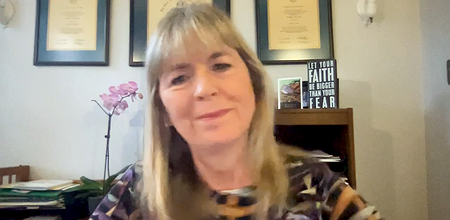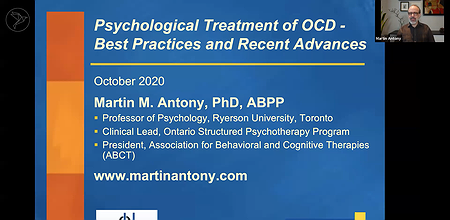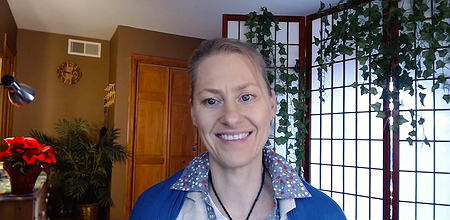A theoretical course illustrated with clinical examples. This course is composed of videos of 5 to 15 minutes each. The PowerPoint of the course to download.
Overcoming Panic and Worry: Mastering Exposure Work with Acceptance, Defusion, Humor, and Paradox
Dr. David Carbonell, Psychologist
Advanced techniques and insights to defuse the most deeply ingrained anxious beliefs
Excerpt:
- 5h of continuing education
- 34 lessons that last from 5 to 15 minutes each
- 1 certificate of achievement
- 1 PowerPoint
- 1 bibliography
- 1 course evaluation
- 4 months access - automatically extended until you complete the course
- 7-day money back guarantee
- 97% of participants who completed the satisfaction survey declare they would recommend this course to a colleague
Overview
Anxiety disorders could be more accurately termed disorders of excessive self-protection: panic attacks do not cause death, obsessive worries about germs do not result in infections, and persistent worry does not lead to insanity. Yet, our chronically anxious clients are often tricked by their own efforts to avoid, distract from, and protect against these perceived dangers. When these dangers do not materialize, they may believe they narrowly escaped a terrible calamity and feel more vulnerable. Consequently, they become increasingly fearful of more and more improbable events.
Treating these clients requires creativity and finesse. If you are already familiar with the basics of exposure therapy and want to expand your clinical toolkit, Dr. David Carbonell’s masterclass will give you the inspiration you need. With over 40 years of experience as a psychologist, Dr. Carbonell presents the fascinating nuances of combining multiple techniques, including the use of humor and paradox, to help clients defuse their deeply ingrained anxious beliefs.
In this workshop, Dr. Carbonell will guide you on how to help your clients disengage from the self-protective behaviors that keep them trapped in anxiety. He will share his techniques to empower your clients to see themselves as capable individuals fooled by anxiety, rather than as defective individuals needing protection. He will provide insights on how to motivate your clients to seek out, rather than avoid, the corrective experiences they need for recovery.
Dr. Carbonell will also present effective strategies drawn from Acceptance and Commitment Therapy (ACT), Paradoxical Therapy, Metacognitive Therapy, and traditional Cognitive Behavioral Therapy (CBT). These strategies will help your clients reconnect with the hopes and dreams they had for life before they were derailed by their struggle against anxiety.
This workshop will feature:
- Understanding on how clients are tricked into a counterproductive struggle against anxiety and the mechanisms of excessive self-protection
- Identifying signs of struggle against anxiety and safety behaviors
- How to help your clients recognize their inherent strengths and capabilities
- Ways to motivate clients to embrace corrective experiences essential for their recovery
- Practical strategies for symptoms management
- Clinical techniques to address client's thoughts, feelings of blame and shame, and self-protective behaviors
This training will equip you with the art of guiding clients towards effective responses to anxiety. Embracing innovative and counterintuitive strategies can empower clients to navigate their anxiety more successfully.
About the expert

Dr. David Carbonell, clinical psychologist, who specializes in helping people overcome fears, phobias and worry.
He is the author of four self- help books: Panic Attacks Workbook, The Worry Trick, Fear of Flying Workbook, and Outsmart Your Anxious Brain: Ten Simple Ways to Beat the Worry Trick.
He is the “coach” of the popular self-help site, anxietycoach.com, and has taught workshops on the treatment of anxiety disorders to more than 10,000 therapists in the U.S. and abroad. He received his doctorate in clinical psychology from DePaul University in 1985 and has maintained a practice devoted to the treatment of anxiety disorders in Chicago since 1990. In his spare time, he is the founding member of The Therapy Players, an improvisational comedy troupe of professional psychotherapists in the Chicago area.
Learning objectives
- Understand how clients become enmeshed in a counterproductive struggle against anxiety.
- Help clients acquire adaptive approaches to managing symptoms.
- Become effective in addressing client shame, blame, and excessive self-protection.
- Implement clinical techniques to address clients’ thoughts, feelings, and behaviors
Learning material
Syllabus
- PowerPoint
-
Understanding Anxiety
- 1. Presentation
- 2. Treating anxiety disorders
- 3. Models to draw from
- 4. The false signals of danger
- 5. The anxiety trick
-
First, Reducing Anxiety
- 6. Anxiety doesn't just fool you once
- 7. The first session - Reducing Anxiety about Treatment
- 8. Video role play- belly breathing
- 9. The controversy about breathing instruction
-
Second, Breaking the Anxiety Cycle
- 10. The rule of opposites
- 11. Finding evidence of the trick in client observations
- 12. The scary movie example
- 13. Identifying safety behaviors
- 14. Avoidance and escape
- 15. Distraction and reassurance
- 16. Support people and objects
- 17. Rituals and superstitions
- 18. Secrecy
- 19. Control
-
Mastering Exposure and Overcoming Panic
- 20. Creating interventions- invite clients to try experiments
- 21. An observing posture
- 22. Responding to high anxiety - the AWARE steps
- 23. The Amygdala- your unconscious guardian
- 24. You never forget your first attack
- 25. Describing a recent attack
- 26. Video role play- 3 powerful questions
- 27. The panic cycle
- 28. What brings the panic to an end
- 29. Models of exposure
- 30. Inhibitory learning
- 31. Exposure guidelines
- 32. Video role play repeating the worry experiment
- 33. Are you motivated to worry?
- 34. Conclusion
- Bibliography
CE Credits
Download a certificate of successful completion.
Audience
This training is intended for mental health professionals.
Your comments
"Excellent presentation!"
A psychologist (Canada)
Registration
Ask a question
Do you have a question? Then email us at contact@asadis.net
Frequently asked questions
-
How long do I have access to the course?
After your registration, the course is accessible anytime and from anywhere for 124 days. And if that’s not enough, we’ll automatically extend your access.
-
When does the course start?
That is entirely up to you! When you buy a course, you'll receive an access link that you can activate when you want.
-
Is there a student rate?
Yes there is! To learn more, email us at contact@asadis.net.
You may also be interested in:
Legal notice
The courses offered by ASADIS are accredited by different professional organisations. In addition, ASADIS is approved by the Canadian Psychological Association to offer continuing education for psychologists. ASADIS maintains responsibility for the program.
The CPA’s approval of an individual, group, or organization as a CE Sponsor or Provider is restricted to the activities described in the approved application or annual report form. The CPA’s approval does not extend to any other CE activity the Sponsor or Provider might offer. In granting its approval, the CPA assumes no legal or financial obligations to Sponsors, Providers, or to those individuals who might participate in a Sponsor or Provider’s CE activities or programs. Further, responsibility for the content, provision, and delivery of any CE activity approved by the CPA remains that of the CE Sponsor or Provider. The CPA disclaims all legal liability associated with the content, provision, and delivery of the approved CE activity.





